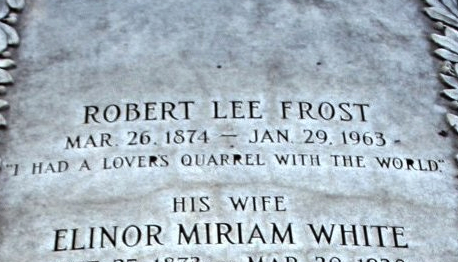Three Poets, One Epitaph: Hardy, Yeats, Frost (Pt. 2)

Part 1 of this essay appeared yesterday. Part 3 (of 3) will appear tomorrow.
Where Thomas Hardy seems to me primarily a pessimist, W. B. Yeats is an ironist. A comparison between “Channel Firing” and any of Yeats’s best political poems—“Easter, 1916,” for example—will show the difference clearly.
“Channel Firing” argues, with admirable style but uncompromising certainty, that there is no solution to the problem of human violence. “Easter, 1916” argues richly against itself, exploring not only the “terrible beauty” born of violence but also the entanglement, in violent times, between the personal and the political:
This other man I had dreamed
A drunken, vainglorious lout.
He had done most bitter wrong
To some who are near my heart,
Yet I number him in the song;
He, too, has resigned his part
In the casual comedy;
He, too, has been changed in his turn,
Transformed utterly:
A terrible beauty is born.
This transformed “lout” is the man who had married Maud Gonne, Yeats’s onetime lover and unattainable muse. John McBride really was a vainglorious drunk, but he was also a martyr in the 1916 Easter Rebellion, and so the poet manages to tear this praise out of himself. He elevates even as he deprecates, or vice versa. In his prose Yeats wrote that “we make out of the quarrel with others, rhetoric, but of the quarrel with ourselves, poetry”—a distinction he honors here and in the vast majority of his poems. Hardy, ultimately a lesser poet than Yeats, always verges on rhetoric.
And yet Yeats’s poetry contains a deep-seated contradiction. While it seeks to embody the opposite of “fanaticism,” the error he believed had taken possession of Gonne, it’s also the product of almost single-minded obsession. Beneath its variety of surface concerns, it’s essentially a long argument with one very opinionated lover who has possessed the poet’s imagination. As such, it partakes of the stubbornness and grandeur—the “violen[ce]” and “nobleness,” as he has it in “No Second Troy”—of the lover herself. (I’ve always thought that any reader of Yeats can see at once what he and Gonne saw in each other, why she kept rejecting his proposals, and why he persisted. I’ve also thought that any reader can see all this more clearly than Yeats himself.) We can resolve this contradiction by suggesting that in Yeats we hear the quarrel as it takes place within the poet’s own head, where other ironic voices may also intrude. So the poetic quarrel with the lover—and the tumultuous Ireland she comes to stand in for—is also a quarrel with the self. We might also note that Yeats’s poems make masterful use of the tools of rhetoric even as they avoid becoming, in his negative sense, rhetorical.
“No Second Troy” itself is an excellent example of rhetorical virtuosity turned to poetic purpose:
Why should I blame her that she filled my days
With misery, or that she would of late
Have taught to ignorant men most violent ways,
Or hurled the little streets upon the great.
Had they but courage equal to desire?
What could have made her peaceful with a mind
That nobleness made simple as a fire,
With beauty like a tightened bow, a kind
That is not natural in an age like this,
Being high and solitary and most stern?
Why, what could she have done, being what she is?
Was there another Troy for her to burn?
This is both a great insult poem and a great love poem. It consists of a series of four rhetorical questions, the first two of which are balanced and syntactically intricate at five lines apiece, the last two of which carry the scorching force of one line each. It publicly criticizes Gonne for attempting to foment revolution (“[hurl] the little streets upon the great”) and accuses the revolutionaries of cowardice. At the same time, the poem spins a private myth—in the degree to which biographical context heightens its effect, it anticipates the Confessionals—and practically bursts with the anguish of its ambivalence. As always, Yeats cannot denounce Gonne without simultaneously idolizing her. She is Helen of Troy, whore and goddess, catalyst of apocalyptic violence and immortal poetry alike. Her mind is “simple as a fire” but also noble in its fiery simplicity; her beauty is “not natural,” which is to say she is unnaturally beautiful. It’s as if the poet is trying to torch her reputation and win her back at the same time.
Despite her overwhelming presence in the major poems, Maud Gonne’s voice never enters them directly. This can be an exceptionally telling omission, as in “Adam’s Curse.” Here the “close friend” of the woman addressed (undoubtedly Gonne) is allowed to speak on behalf of womankind, while Gonne herself is not. Indeed the dialogue between the speaker and the friend constitutes more of an agreement than a disagreement, and coalesces into a single argument aimed squarely against Gonne. Just as poets, according to Yeats, “work harder” than the rest of the world at their craft, so, the friend replies, women must “labor to be beautiful”; and so, Yeats rejoins, traditional lovers must labor at the “high courtesy” of courtship. But love, he adds pointedly—as he sits beside the woman who has rejected his own efforts—has become “an idle trade” in the present generation. There are any number of things a woman in Gonne’s position might reasonably say to this (for example, that there is such a thing as trying too hard); in the poem, however, conversation falls silent, and the poem ends with the speaker brooding on his own love’s failure as a failure of love itself.
I had a thought for no one’s but your ears:
That you were beautiful, and that I strove
To love you in the old high way of love:
That it had all seemed happy, and yet we’d grown
As weary-hearted as that hollow moon.
Thus even when Yeats ventures “outside his own head” in dramatic lyrics, he doesn’t really: the perspective that would best counterbalance his own—Gonne’s—is never represented. Meanwhile his personae (such as the speaker of “The Song of Wandering Aengus”) are thin disguises. What saves his poetry from becoming petulant or polemical is the candor of his self-analysis: he is genuinely at odds with himself and driven to reproduce those internal contradictions on the page, if only as a way of sorting them out. The overall effect is of a fervent unburdening.
That’s why “Cast a cold eye / On life, on death. / Horseman, pass by!” strikes such a dubious note as his epitaph, and why Frost’s “I had a lover’s quarrel with the world” seems so much more apt. Yeats could be “cold / And passionate as the dawn” (to borrow his phrase from “The Fisherman”), but always with the emphasis firmly on passionate. The firelike mind of Helen in “No Second Troy” is also the “fire in [the] head” of Wandering Aengus. Both Yeats and Gonne had an unquenchably zealous streak, and in Yeats’s poems we see one complex side of their emotional war.





